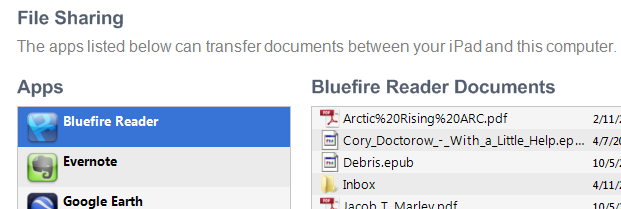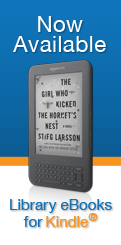For Marlene’s birthday I got her a new iPad. Since her work involves reading and reviewing ebooks, and since the iPad has become her primary ebook reader, transferring the books from her old iPad to the new one was critical. Since she uses a number of ebook apps, this gave us an opportunity to answer the (not-so) age-old question: when you open the new box, are the ebooks still alive and meowing?
We set up the new iPad using one of the recommended approaches:
- Sync the old iPad with iTunes.
- Make a backup of the old iPad using iTunes.
- Hook up the new iPad to the computer and choose to restore from the backup.
- After the restoration, wait for iTunes to finish syncing apps and content to the new iPad.
How did the the various apps do?
- iBooks — success. All of the titles came over.
- Amazon Kindle for iPad — success. The list of titles came over. It was necessary to re-download them, but that came as no surprise.
- Barnes and Noble Nook — success. The list of titles came over; as with the Kindle app, it was necessary to re-download the books.
- Bluefire Reader — success. Everything came over, although it was necessary to re-enter the Adobe DRM credentials.
- Google Play Books — success. Same story as the Kindle and Nook apps.
- Kobo for iPad — success. At least, apparently so. The default titles came over, but this app is one that Marlene looked at but never actively used.
However, there was one failure: the OverDrive app for iPad. When we opened it on the new iPad, the bookshelf was empty!
Of course, the primary purpose of this app is to display ebooks and audiobooks from OverDrive’s library service, but it will happily store and open EPUB files, and you don’t even need the OverDrive Media Console application on your PC. You can just download an EPUB from Safari on the iPad and open it in OverDrive. Because of apparent capacity issues with Bluefire reader, there was a period of Marlene had started using the OverDrive app to handle some of the overflow; in particular, she used it for non-DRM EPUBs.
But therein lies the rub… as near as I can tell, the OverDrive app turns out to be the Hotel California of iOS EPUB readers. Since the restore and iTunes sync obviously hadn’t brought the ebooks over, I started looking for ways to manually transfer them. The first place I looked was in the File Sharing feature in iTunes:
If OverDrive supported app file sharing, I could have used iTunes to copy the ebooks from the old iPad to the new one. Unfortunately… it doesn’t.
My next step was scanning through the OverDrive app to see if it offered a way to download or email the files. I came up with nothing.
Finally, I turned to my favorite reference librarian Google… and came up with a lot of folks complaining about how iOS5 and the recent update of the app apparently don’t play well together for audiobooks, but nothing relevant to my efforts. So, if you’ve made this far into the post and have ideas about how to transfer the books… I’m all ears.
Ultimately, if we don’t find a way to make the transfer, the effective loss will be small, as Marlene has current files for all of the titles in the OverDrive app with the exception of three titles she had downloaded via iOS Safari from NetGalley that have since been removed from the active download list. One irony is that those three ebooks are in open EPUB format; if only we could get to the files, any EPUB reader app could display them.
This is all a perfect storm of circumstances that could drive somebody who is unlike me (by expecting that software will actually work all the time) back into the comfortable but heavy arms of physical books:
- Ebook DRM can punish the reader. Marlene and I are perfectly willing to pay for ebooks (though of course, most of the time she doesn’t have to because of the number of egalleys and ARCs she reviews), but in the case of the OverDrive app, were I to make a charitable guess, DRM inspired a design compromise for the OverDrive app that lead to app file sharing not being enabled, even for non-DRM ebooks.
- Apple’s iOS backup and syncing model has pitfalls for the unwary. In particular, backing up to iTunes does not back up everything, and syncing with iTunes does not necessary cover content that wasn’t purchased via iTunes. Want a real full backup of your iOS device? It seems like you can get one only if you jailbreak it. By the way, I really hope to be proven wrong on this.
- It’s a truism that preserving ebooks require the reader to work harder. You can leave a physical book sitting around and expect it to stay put (and even a very industrious cat isn’t going to push a book very far); one has to actually think in order to keep one’s ebooks available as time, hardware upgrades, and fashions in digital format pass. But it’s even harder if one has to work to get one’s hands on the ebook file.
- Using apps for anything other than their exact intended purpose can have unexpected pitfalls. As an EPUB reader, the OverDrive app is arguably decent, but at the moment I can no longer recommend it for any purpose other than using OverDrive’s service. I hope future updates of the app will make it easier to transfer titles to new iOS devices and to back up any non-library ebooks that a user chooses to read in OverDrive.
In conclusion (and to further inflict quantum mechanics metaphors on the reader), despite all of the advantages of ebooks, ebook users must still keep the Ebook Uncertainty Principle in mind: without care (and ideally access to discrete, non-DRM ebook files that you can back up), the long-term availability of ebooks that you purchase is at best a little uncertain.








